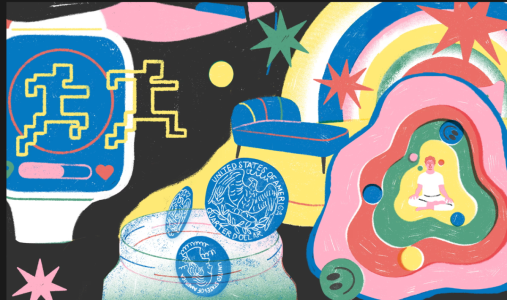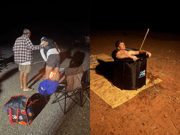Think it’s too late to change? Experts say this is exactly how to begin again
By
Maan
- Replies 0
Starting something new—whether it’s a habit, a hobby or a major lifestyle change—can feel overwhelming, confusing or even a little intimidating.
Where do you begin, what should you expect, and how do you know you’re on the right track?
In this guide, experts break down the first steps to getting started with a range of everyday pursuits, from running and therapy to budgeting and dating.
Trying something new often felt daunting, especially when it involved change, uncertainty or forming a new habit.
Whether it was striking up a chat with a stranger, heading to therapy, or getting into fitness, the biggest hurdle was often just getting started.
In How to Start, experts shared their tips on how to approach a range of activities, from lifting weights to learning how to talk to strangers.
Meditation requires nothing but your own mind and possibly a timer.
It offers benefits like improved gut health, reduced insomnia, and lower anxiety and depression levels.
Experts suggested beginning with short sessions—five to 15 minutes—focusing on consistency over length.
Sitting upright with relaxed hands and either closed eyes or a soft gaze on the floor helped with focus.
The trick was to notice your breath and thoughts, let distractions pass, and return to your breath each time your mind wandered.
To stay committed, people were encouraged to explore different forms of meditation, from walking to loving-kindness, or join online or local communities.
Running appeals for its simplicity—it only requires a good pair of shoes and could begin with walking.
Those starting out were advised to alternate between running and walking, gradually increasing running time while decreasing walking breaks.
A slow, conversational pace was recommended, avoiding the common trap of overexerting too soon.
Rest days are crucial while adjusting to the new routine.
Investing in proper shoes, ideally fitted in-store, helped prevent injuries.
Rather than pushing distance, beginners are better off focusing on consistency, enjoyment and eventually adding strength training.
Finding a community also helps maintain motivation.
Lifting weights has benefits beyond physical appearance—research showed strength training improved metabolism and bone strength.
Beginners could start with bodyweight moves like planks, pushups and lunges to build a foundation.
Using machines at the gym offered structure and helped with learning movement patterns.
Experts recommended beginning with light weights and increasing only when form improved and 10 reps felt manageable with room for 2–3 more.
Tracking progress weekly, resting between sessions and training 2–3 times a week was plenty for newcomers.
Fuel was just as important—Dr Andrew Jagim from Mayo Clinic Health System said: ‘1.2 gms of protein per kg of body weight is a good rule of thumb’.
Over time, progressive overload—slightly increasing difficulty each session—was essential for continuous muscle growth.
Therapy is useful for everything from feeling stuck to addressing diagnosed mental illness.
To begin, people could search ‘psychotherapist near me’ or ask friends for recommendations.
Figuring out how to pay was often the first challenge, particularly in the US, where insurance coverage varies.
Many therapists offers free 15-minute phone consults, and experts advised trying a full session to assess fit.
It could take multiple tries to find the right therapist, and people are encouraged to be selective.
‘Be picky—it’s an important relationship, and it can take time to find the right one.’
Budgeting is often avoided due to the emotional stress tied to money, but it offers relief and clarity.
Robin Snell, a certified financial planner, said: ‘You can start to pinpoint where money is going for your own happiness’.
The first step was tracking every dollar for 30–90 days.
Most people faced one of three hurdles: not earning enough, having high fixed expenses, or struggling with spending habits.
High-interest debts (over 7 per cent) needed to be paid off first.
Setting clear goals, such as saving 10–20 per cent of income, helped focus efforts.
Sticking to a plan long-term often requires automation, like setting up separate savings accounts for specific purposes.
Dating takes effort, but also promises fun along the way.
Experts recommended starting by ‘dating yourself’—clarifying your own values and desires before seeking someone else.
While in-person setups and mutual friends are still options, dating apps offered the broadest reach.
Strong profiles mattered, with at least six current photos and a bio that reflected personality and interests.
Online chats should be consistent but not drawn out—experts suggested around 15 minutes twice daily.
First dates worked best as low-investment plans like walks or coffee.
Dating more than one person at a time prevented tunnel vision and helped spot red flags.
Conversations with strangers make people happier and help build a sense of connection.
Good eye contact, being ready with a few light topics, and knowing that connection—not impressing someone—was the goal, made it easier.
Asking basic questions worked fine; they don't need to be clever.
Small talk was underrated and could help identify shared interests—just avoid politics, sex and religion.
Being aware of body language helps you know when to end the conversation.
Experts reminded people that chatting was a skill like any other, and practice made it easier.
Reducing your carbon footprint doesn't have to be perfect—starting small still makes a difference.
Darby Hoover from the NRDC said: ‘Everyone has an impact…We need action at all levels’.
The three Rs—reduce, reuse, recycle—were fundamental, with reduction being the most important.
Eating more plant-based meals helped cut emissions, but consistency mattered more than drastic changes.
Cutting energy waste by unplugging appliances and turning off power strips makes a difference too.
Ultimately, using your voice—talking about climate and voting for environmentally strong candidates—was the most powerful tool.
Taking that first step into something unfamiliar can stir up fear, doubt and hesitation—but you're not alone in feeling that way.
Watch this inspiring talk to hear how one expert reframed the fear of starting and turned it into a powerful motivator.
Source: Youtube/TEDx Talks

Which of these fresh starts feels most exciting—or maybe a little terrifying—to you? Let us know your thoughts in the comments.
Where do you begin, what should you expect, and how do you know you’re on the right track?
In this guide, experts break down the first steps to getting started with a range of everyday pursuits, from running and therapy to budgeting and dating.
Trying something new often felt daunting, especially when it involved change, uncertainty or forming a new habit.
Whether it was striking up a chat with a stranger, heading to therapy, or getting into fitness, the biggest hurdle was often just getting started.
In How to Start, experts shared their tips on how to approach a range of activities, from lifting weights to learning how to talk to strangers.
Meditation requires nothing but your own mind and possibly a timer.
It offers benefits like improved gut health, reduced insomnia, and lower anxiety and depression levels.
Experts suggested beginning with short sessions—five to 15 minutes—focusing on consistency over length.
Sitting upright with relaxed hands and either closed eyes or a soft gaze on the floor helped with focus.
The trick was to notice your breath and thoughts, let distractions pass, and return to your breath each time your mind wandered.
To stay committed, people were encouraged to explore different forms of meditation, from walking to loving-kindness, or join online or local communities.
Running appeals for its simplicity—it only requires a good pair of shoes and could begin with walking.
Those starting out were advised to alternate between running and walking, gradually increasing running time while decreasing walking breaks.
A slow, conversational pace was recommended, avoiding the common trap of overexerting too soon.
Rest days are crucial while adjusting to the new routine.
Investing in proper shoes, ideally fitted in-store, helped prevent injuries.
Rather than pushing distance, beginners are better off focusing on consistency, enjoyment and eventually adding strength training.
Finding a community also helps maintain motivation.
Lifting weights has benefits beyond physical appearance—research showed strength training improved metabolism and bone strength.
Beginners could start with bodyweight moves like planks, pushups and lunges to build a foundation.
Using machines at the gym offered structure and helped with learning movement patterns.
Experts recommended beginning with light weights and increasing only when form improved and 10 reps felt manageable with room for 2–3 more.
Tracking progress weekly, resting between sessions and training 2–3 times a week was plenty for newcomers.
Fuel was just as important—Dr Andrew Jagim from Mayo Clinic Health System said: ‘1.2 gms of protein per kg of body weight is a good rule of thumb’.
Over time, progressive overload—slightly increasing difficulty each session—was essential for continuous muscle growth.
Therapy is useful for everything from feeling stuck to addressing diagnosed mental illness.
To begin, people could search ‘psychotherapist near me’ or ask friends for recommendations.
Figuring out how to pay was often the first challenge, particularly in the US, where insurance coverage varies.
Many therapists offers free 15-minute phone consults, and experts advised trying a full session to assess fit.
It could take multiple tries to find the right therapist, and people are encouraged to be selective.
‘Be picky—it’s an important relationship, and it can take time to find the right one.’
Budgeting is often avoided due to the emotional stress tied to money, but it offers relief and clarity.
Robin Snell, a certified financial planner, said: ‘You can start to pinpoint where money is going for your own happiness’.
The first step was tracking every dollar for 30–90 days.
Most people faced one of three hurdles: not earning enough, having high fixed expenses, or struggling with spending habits.
High-interest debts (over 7 per cent) needed to be paid off first.
Setting clear goals, such as saving 10–20 per cent of income, helped focus efforts.
Sticking to a plan long-term often requires automation, like setting up separate savings accounts for specific purposes.
Dating takes effort, but also promises fun along the way.
Experts recommended starting by ‘dating yourself’—clarifying your own values and desires before seeking someone else.
While in-person setups and mutual friends are still options, dating apps offered the broadest reach.
Strong profiles mattered, with at least six current photos and a bio that reflected personality and interests.
Online chats should be consistent but not drawn out—experts suggested around 15 minutes twice daily.
First dates worked best as low-investment plans like walks or coffee.
Dating more than one person at a time prevented tunnel vision and helped spot red flags.
Conversations with strangers make people happier and help build a sense of connection.
Good eye contact, being ready with a few light topics, and knowing that connection—not impressing someone—was the goal, made it easier.
Asking basic questions worked fine; they don't need to be clever.
Small talk was underrated and could help identify shared interests—just avoid politics, sex and religion.
Being aware of body language helps you know when to end the conversation.
Experts reminded people that chatting was a skill like any other, and practice made it easier.
Reducing your carbon footprint doesn't have to be perfect—starting small still makes a difference.
Darby Hoover from the NRDC said: ‘Everyone has an impact…We need action at all levels’.
The three Rs—reduce, reuse, recycle—were fundamental, with reduction being the most important.
Eating more plant-based meals helped cut emissions, but consistency mattered more than drastic changes.
Cutting energy waste by unplugging appliances and turning off power strips makes a difference too.
Ultimately, using your voice—talking about climate and voting for environmentally strong candidates—was the most powerful tool.
Taking that first step into something unfamiliar can stir up fear, doubt and hesitation—but you're not alone in feeling that way.
Watch this inspiring talk to hear how one expert reframed the fear of starting and turned it into a powerful motivator.
Source: Youtube/TEDx Talks
Key Takeaways
- Getting started is often the hardest part, whether it’s with fitness, therapy, or a new habit.
- Experts suggest beginning with small, consistent steps—like short meditations, slow runs or light weights—to build confidence.
- Budgeting and dating both benefit from planning, tracking, and taking the time to understand your own goals and values.
- From chatting with strangers to reducing your carbon footprint, progress comes from practice, awareness and small, repeated efforts.
Which of these fresh starts feels most exciting—or maybe a little terrifying—to you? Let us know your thoughts in the comments.








